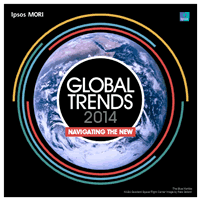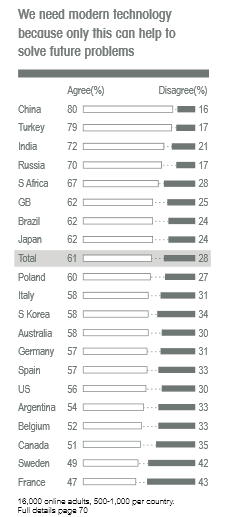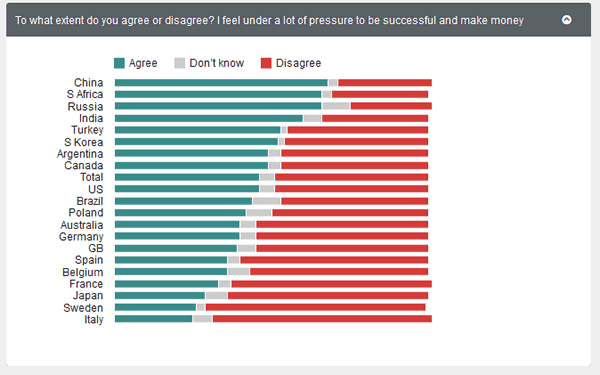“I measure my success by the things I own”. Or in other words: I need to be able to buy – and thus earn or get – a lot in order to feel successful. It’s one of many questions/statements (over 200 in total) asked for the “Ipsos Global Trends 2014: Navigating the new” report.
While the 2014 edition of the report focuses on many trends such as trust, globalization, technology and brands (across 20 countries), this one says so much about our world and, when correlating with other findings, about the trends in many areas. “Ownership” and success. It’s still a driver for many global evolutions: technological (or is it the other way around too?), economical and geopolitical. Where would it fit in the “four fundamental human needs“? I fear everywhere in this day and age and I guess it’s not a cooincidence we talk about topics such as conscious capitalism. What is the price we pay? And what are the global trends overall?
Let’s start with the measurement of success as defined by the “ownership of things”, in the strictly materialistic sense.

In descending order, the top 10 of countries where people agreed most with the statement “I measure my success by the things I own”:
- China: 71%.
- India: 58%.
- Turkey: 57%.
- Brazil: 48%.
- South Korea: 45%.
- Poland: 39%.
- France: 34%.
- South Africa: 33%.
- Russia: 32%.
- Argentina: 29%.
The average (again, 20 countries): 34%.

The realities and tensions behind human attitudes
This says so much about many economical trends. The export of capitalism. Also, look at that top 10 (especially the top 5) and compare it with the responses to 2 other statements in the “Global Trends 2014” survey:
We need modern technology because only this can help to solve future problems.
Again, in decreasing order of agreement:
- China: 80%.
- Turkey: 79%.
- India: 72%.
- Russia: 70%.
- South Africa: 67%.
- Great Britain: 62%.
- Brazil: 62%.
- Japan: 62%.
- Poland: 60%.
- Italy: 58%.
Average of all 20 countries: 61%.
Globalization is good for my country
- China: 81%.
- India: 71%.
- Brazil: 68%.
- South Africa: 66%.
- Sweden: 62%.
- South Korea: 66%.
- Argentina: 56%.
- Japan: 55%.
- Turkey: 50%.
- Canada: 47%.
My success, Generation Now and the price we pay
The report also mentions the culture of now as a key phenomenon from the technology perspective, the distrust regarding governments and businesses, the trust consumers (people) put in others, the desire for control and the tension between cultural traditions and the desire to break lose from them. Digital technologies often get cited in that regard. No surprise in the age of digital business.
It also looks at how consumers make decisions. It’s not a coiincidence that in China, India, Turkey and Brazil we find most respondents saying they always try to buy branded products. Do you see how it all connects?
The desire for control, money, possession, choice and empowerment, along with distrust, however, also comes with a price. A human one. More than one. Pressure but also the desire life would be more simple – seen among screen addicts, those in so-called developed countries but also the “emerging countries”. Everywhere really.
In the end, these desires are about “ownership” as well, in another sense: the non-materialistic one. The ownership of our lives and decisions, supported by the promise and dream of a digital world where control and empowerment seem to be behind every screen.

Similar tensions – between what people think about the benefits of, for instance, the Internet, and their attitudes regarding the experiences they have using it, are all across the charts you can see on the survey website, such as this section on attitudes regarding technology.
Global Trends 2014: the regional drivers of the global economy (and more)
Correlate all these questions/answers and especially the first one (“I measure….”) with the replies on questions regarding the importance of traditions in the societies of each country, how people like to make their own choices or not, degree of happiness, the use of screens, the expectations regarding the personal financial situation and to what extent respondents from each country feel the life of today’s youth is better or worse.
You’ll understand the drivers of the economic growth for the years to come, why some countries are hard to enter, the challenges for brands in several regions/areas and why so many organizations and leaders are investing heavily in the BRICS countries (Brazil, Russia, India, China, and South Africa), APAC (Asia-Pacific), parts of Eastern Europe, South-America and of the Middle East. You can add Africa to that list, even if the report just looked at South-Africa, which is not the country in Africa where many organizations notice huge growth (potential).
“I measure my success by the things I own”. It’s such a crucial – human – indicator, as is the degree of happiness and this tension in many areas. Their impact is felt across a huge number of digital, economic and political evolutions across the globe, whereby the epicenters of growth and investments, as well as the epicenters of power, are not where they used to be for a very long time. Not at all.
Check out the analysis of the mega-trends, according to the survey, in the PDF or find them all in a more interactive way.
It also helps understanding the wars raging across the globe to control natural resources and possess. In memory of the victims of flight MH17 and all the wars. And shocked by the rhetorics of “world leaders” that are far louder than the cries of victims paying the price of the urge to own.

